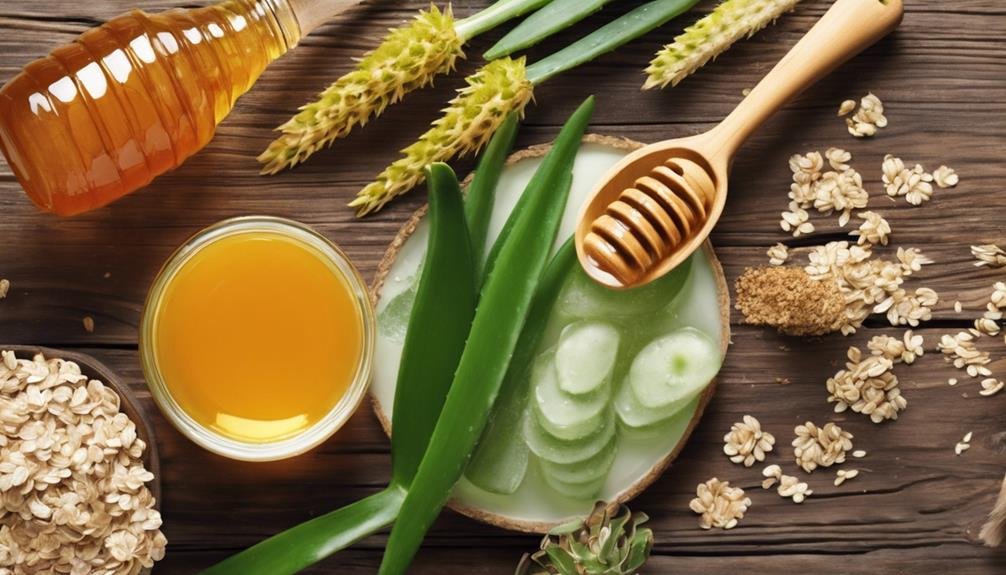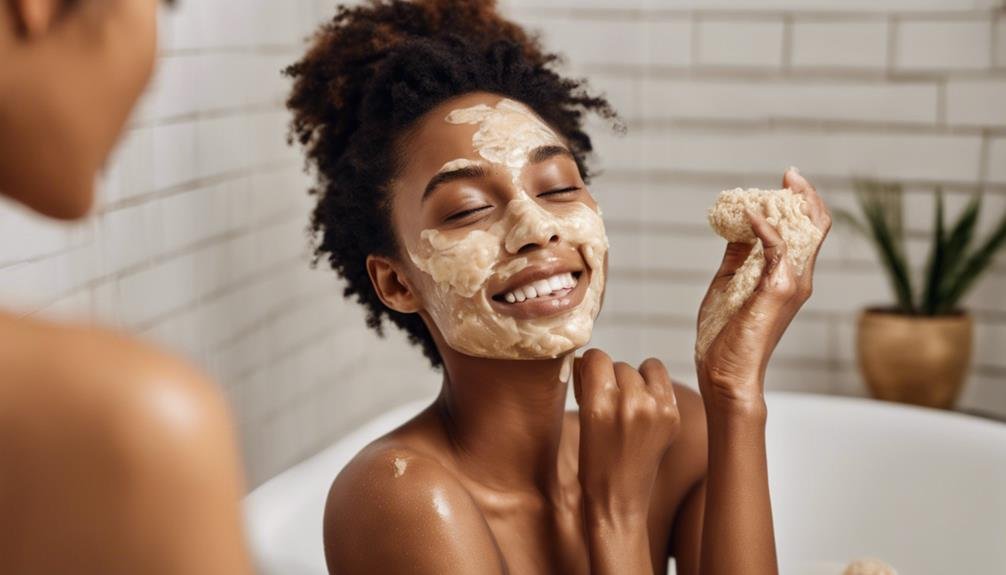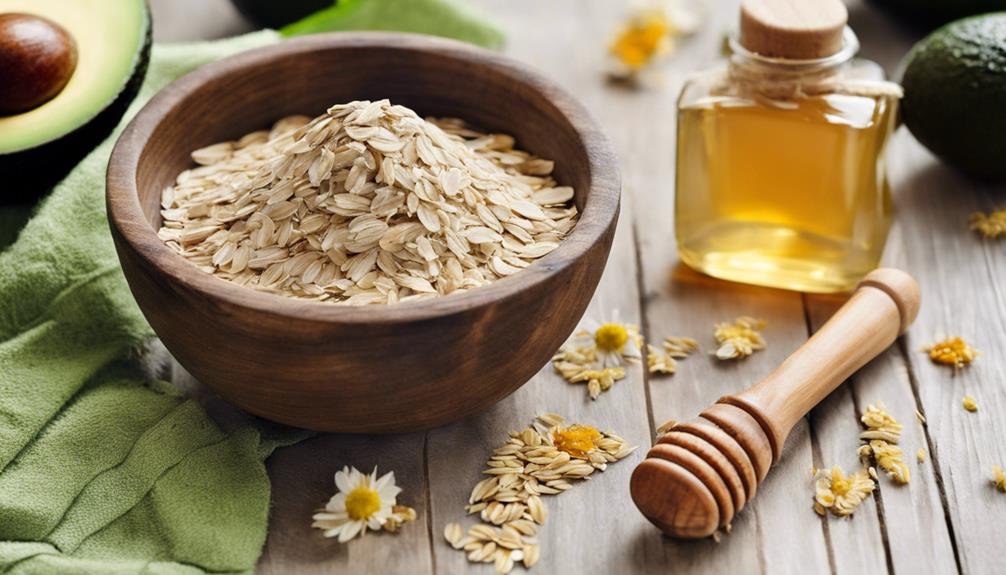"Cherishing Little Steps - A Haven for Baby and Family Journeys"
Achieving Perfect Skin Naturally
To achieve perfect skin naturally, you must understand the power of harnessing the goodness of nature for your skincare routine. From nourishing honey masks to hydrating watermelon slices, there are various ways to enhance your skin's health without relying on synthetic products. By exploring the benefits of natural ingredients and adopting a holistic approach to skincare, you can pave the way for a radiant complexion that glows from within. But remember, the key lies not only in what you put on your skin but also in how you treat it as a whole.
Key Takeaways
- Cleanse with honey, aloe vera, and coconut oil for balanced, radiant skin.
- Stay hydrated with water-rich foods like watermelon and cucumbers for skin elasticity.
- Gentle exfoliation with jojoba beads or fruit enzymes for smooth, clear skin.
- Boost skin health with antioxidant-rich foods like berries and leafy greens.
- Protect skin from sun damage with broad-spectrum sunscreen and protective measures.
Cleansing With Natural Ingredients

When it comes to achieving perfect skin naturally, cleansing with natural ingredients is a crucial step in maintaining a healthy complexion. Natural ingredients like honey, aloe vera, and coconut oil can effectively cleanse your skin without harsh chemicals that may cause irritation or dryness.
Honey, with its antibacterial properties, can help fight acne and nourish your skin. Aloe vera is soothing and can reduce inflammation, making it ideal for sensitive skin types. Coconut oil not only removes impurities but also moisturizes the skin, leaving it soft and supple.
These natural ingredients work in harmony with your skin, helping to balance oil production, reduce breakouts, and promote a radiant glow. When choosing natural cleansers, look for products with minimal added fragrances and preservatives to ensure the purity of the ingredients.
Incorporating natural cleansing ingredients into your skincare routine can lead to healthier, more vibrant skin without the use of harsh chemicals.
Hydrating From the Inside Out
To maintain your skin's health and radiance, hydrating from the inside out plays a significant role in achieving a flawless complexion. Proper hydration is crucial for skin health as it helps to maintain elasticity, prevent dryness, and promote a youthful glow. Drinking an adequate amount of water daily is essential, but you can also support skin hydration through your diet. Include foods rich in water content such as cucumbers, watermelon, and oranges to boost your skin's hydration levels naturally.
Consider incorporating these hydrating foods into your diet:
| Hydrating Foods | Benefits |
|---|---|
| Cucumbers | High water content and antioxidants support skin hydration and reduce inflammation. |
| Watermelon | Contains vitamins A, C, and antioxidants that help in hydrating and rejuvenating the skin. |
| Oranges | Rich in vitamin C, which aids in collagen production for supple and hydrated skin. |
Gentle Exfoliation for Glowing Skin

For achieving a radiant and smooth complexion, incorporating gentle exfoliation into your skincare routine is key. Gentle exfoliation helps remove dead skin cells, unclog pores, and reveal fresh, glowing skin underneath. It can improve skin texture, reduce dullness, and even out skin tone.
When choosing an exfoliant, opt for products with gentle ingredients like jojoba beads, fruit enzymes, or alpha hydroxy acids (AHAs) to prevent irritation. Limit exfoliation to 1-2 times a week to avoid over-exfoliating, which can damage the skin's barrier.
To exfoliate, apply the product to damp skin using gentle circular motions, then rinse thoroughly with lukewarm water. Follow up with a hydrating moisturizer to replenish the skin's moisture barrier. Be cautious with physical exfoliants like scrubs, as they can be harsh on the skin. Instead, consider chemical exfoliants like AHAs or BHAs for a milder approach.
Regular exfoliation can enhance the absorption of skincare products and help maintain a healthy glow.
Incorporating Antioxidant-Rich Foods
Enhancing your skincare regimen with antioxidant-rich foods can significantly benefit your skin's health and appearance. Antioxidants help combat free radicals, which can damage skin cells and accelerate aging. Incorporating foods like berries, leafy greens, nuts, and seeds into your diet can provide your skin with a powerful arsenal of antioxidants.
Berries such as blueberries, raspberries, and strawberries are rich in vitamin C and polyphenols, which help protect the skin from oxidative stress.
Leafy greens like spinach and kale are high in vitamins A, C, and E, known for their skin-rejuvenating properties.
Nuts and seeds like almonds, walnuts, and chia seeds contain essential fatty acids and antioxidants that support skin health.
Protecting Skin From Sun Damage

Shielding your skin from the harmful effects of sun exposure is crucial for maintaining its health and youthful appearance. Sun damage can lead to premature aging, wrinkles, sunspots, and even skin cancer.
To protect your skin, always apply a broad-spectrum sunscreen with at least SPF 30 before going outside, even on cloudy days. Reapply every two hours, or immediately after swimming or sweating.
Wearing protective clothing, such as hats and sunglasses, can further shield your skin from the sun's harmful rays. Seek shade during peak sun hours, typically between 10 a.m. and 4 p.m., when the sun's rays are strongest.
It's important to remember that sun damage is cumulative, so consistent protection is key. Incorporating these sun protection measures into your daily routine can significantly reduce the risk of skin damage and maintain your skin's natural radiance.
Always prioritize sun safety to keep your skin healthy and glowing for years to come.
Getting Enough Beauty Sleep
Ensuring you get enough beauty sleep is essential for maintaining healthy, glowing skin. During sleep, your body goes into repair mode, producing collagen that helps in skin elasticity and reducing wrinkles. Lack of sleep can lead to increased cortisol levels, which can break down collagen, leading to dull skin and fine lines. Additionally, inadequate sleep affects the skin's ability to retain moisture, resulting in dryness and a lackluster complexion.
Research suggests that adults should aim for 7-9 hours of quality sleep each night to support skin health. To improve your sleep quality, establish a relaxing bedtime routine, keep your bedroom cool and dark, and avoid screens before bed. Creating a consistent sleep schedule can also help regulate your body's internal clock, leading to better sleep patterns.
Stress Management for Clear Skin

Getting enough beauty sleep is undoubtedly crucial for healthy skin, but another factor that significantly impacts your skin's clarity and overall health is stress management. Stress can trigger various skin issues, such as acne breakouts, eczema flare-ups, and premature aging. When you're stressed, your body releases cortisol, a hormone that can increase oil production in your skin and lead to inflammation. This can exacerbate existing skin conditions or create new ones, making it essential to manage stress effectively for clear skin.
To maintain clear and healthy skin, consider incorporating stress management techniques into your daily routine. Practices like yoga, meditation, deep breathing exercises, or even spending time in nature can help reduce stress levels and promote skin health.
Additionally, getting regular exercise, prioritizing self-care, and ensuring you have a strong support system can all contribute to better stress management and ultimately clearer skin. By taking steps to manage stress effectively, you can support your skin's natural balance and achieve that coveted healthy glow.
Using Natural Oils for Hydration
To maintain optimal skin hydration, incorporating natural oils into your skincare routine can be highly beneficial. Natural oils are rich in vitamins, antioxidants, and fatty acids that nourish and hydrate the skin, helping to restore its natural balance and radiance. When choosing natural oils, opt for non-comedogenic options like jojoba oil, argan oil, or rosehip oil to prevent clogged pores and breakouts.
Jojoba oil closely resembles the skin's natural sebum, making it an excellent moisturizer for all skin types. Argan oil is packed with vitamin E and essential fatty acids, providing intense hydration and improving skin elasticity. Rosehip oil is high in antioxidants and vitamin A, aiding in skin regeneration and evening out skin tone.
To incorporate natural oils into your skincare routine, apply a few drops onto damp skin after cleansing and toning. Gently massage the oil into your skin in upward motions to promote absorption. Regular use of natural oils can help you achieve glowing, hydrated skin naturally.
DIY Face Masks for a Spa Day

Maintaining your skin's hydration is just one step in achieving a radiant complexion. Another way to pamper your skin is by indulging in some DIY face masks for a spa day at home. These masks can help nourish and revitalize your skin, leaving it glowing and refreshed.
For a hydrating mask, mix mashed avocado with a teaspoon of honey and a splash of coconut water. Avocado is rich in healthy fats that moisturize the skin, while honey has antibacterial properties and coconut water is hydrating.
To brighten your complexion, try a mask with yogurt, turmeric, and a squeeze of lemon. Yogurt contains lactic acid for gentle exfoliation, turmeric has anti-inflammatory benefits, and lemon helps to lighten dark spots.
For oily or acne-prone skin, a mask with clay, apple cider vinegar, and tea tree oil can be effective. Clay helps to absorb excess oil, apple cider vinegar balances the skin's pH, and tea tree oil has antimicrobial properties.
These DIY face masks can provide a luxurious spa experience while improving your skin's health and appearance.
Supporting Skin Health With Vitamins
For optimal skin health, incorporating essential vitamins into your daily routine is crucial. Vitamins play a key role in supporting skin health and can help you achieve that perfect glow naturally.
Vitamin C, known for its antioxidant properties, can help brighten your skin and protect it from environmental damage.
Vitamin E is another powerhouse vitamin that works to nourish and hydrate your skin, keeping it youthful and supple.
Vitamin A promotes skin cell turnover, aiding in the renewal process for smoother and clearer skin.
B vitamins, such as biotin and niacinamide, are essential for maintaining overall skin health and can help improve conditions like acne and dryness.
To ensure you're getting an adequate amount of these vitamins, consider incorporating a balanced diet rich in fruits, vegetables, nuts, and seeds. Additionally, you may opt for supplements under the guidance of a healthcare professional to address any deficiencies and support your skin from the inside out.
Exercise for a Radiant Complexion

Regular physical activity not only benefits your overall health but also contributes significantly to achieving a radiant complexion. Exercise boosts circulation, delivering oxygen and essential nutrients to your skin cells while carrying away harmful toxins. This process helps nourish your skin from within, giving you a healthy glow. Additionally, when you work up a sweat during exercise, your body releases toxins through your sweat glands, promoting clearer skin.
Moreover, physical activity helps reduce stress levels, which can have a positive impact on your skin. High-stress levels can lead to skin issues like acne and eczema, so engaging in regular exercise can help manage stress and prevent these problems.
Whether it's yoga, jogging, dancing, or any other form of physical activity you enjoy, aim for at least 30 minutes most days of the week. Remember to cleanse your skin post-workout to prevent sweat from clogging your pores. Exercise is a natural and effective way to enhance your complexion, making it an essential part of your journey to perfect skin.
Maintaining a Healthy Skincare Routine
To achieve and maintain a healthy complexion, it's crucial to establish a consistent skincare routine tailored to your skin type and concerns. Start by identifying whether you have dry, oily, combination, or sensitive skin, as this will guide you in selecting the right products.
Cleansing is the foundation of any skincare routine; use a gentle cleanser that suits your skin type to remove impurities without stripping away natural oils. Follow up with a toner to balance your skin's pH levels and prepare it for subsequent products.
Incorporating a moisturizer is essential, even for oily skin, as it helps maintain hydration and protect the skin barrier. Don't forget to apply sunscreen daily to shield your skin from harmful UV rays and prevent premature aging.
Consider adding serums or treatments targeting specific concerns like acne, hyperpigmentation, or aging. Consistency is key in skincare – stick to your routine and be patient for results to show.
Frequently Asked Questions
Can Hormonal Changes Affect Skin Health?
Yes, hormonal changes can significantly impact skin health. Fluctuations in hormones, such as during puberty or menopause, may lead to acne, dryness, or other skin issues. Consult a dermatologist for personalized advice on managing hormonal skin changes.
How Does Pollution Impact Skin Condition?
Pollution impacts your skin by clogging pores, leading to dullness, acne, and premature aging. Chemical pollutants can cause oxidative stress and inflammation, disrupting skin's natural balance. Protect your skin by cleansing thoroughly and using antioxidants.
Is There a Link Between Diet and Acne?
You know that connection between diet and acne? It's not just a myth. What you eat can significantly impact your skin. Foods high in sugar and dairy might worsen breakouts, while antioxidants and omega-3s can help clear things up.
Can Genetics Influence Skin Aging?
Yes, genetics can greatly influence skin aging. Factors like collagen production, elasticity, and skin thickness are all impacted by your genetic makeup. It's essential to understand your genetic predispositions and tailor your skincare routine accordingly.
What Role Does Hydration Play in Skin Rejuvenation?
Hydration is key for skin rejuvenation. It helps maintain skin elasticity, promotes cell turnover, and enhances overall appearance. By drinking water, using moisturizers, and incorporating hydrating foods, you can support your skin's natural rejuvenation process effectively.
Conclusion
In conclusion, achieving perfect skin naturally is a journey that requires dedication and consistency. By incorporating natural ingredients, staying hydrated, exfoliating gently, and protecting your skin from sun damage, you can support your skin's health from within. Remember, a balanced diet rich in antioxidants and vitamins, along with regular exercise, can help you achieve radiant and flawless skin. So go ahead, pamper yourself with DIY spa days and maintain a healthy skincare routine to glow from the inside out.

